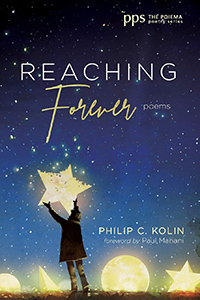Here is a remarkable collection of new poems, each one starting out within the finite world but extending itself in metaphor and rich verbiage toward the infinite, the eternal. The book’s cover shows a human figure holding up a star as if ready to launch it into space. Likewise, the poet seems to be standing on some sort of beach, a margin where land, sea, and air join in a changeable boundary that represents the fluidities of existence on this God-ordained planet.
This
has been Philip Kolin’s lifelong attitude as a poet-Christian — firmly grounded
in the realities of human existence but open to infinite possibilities that
celebrate the transcendent, the miraculous. A distinguished professor of
English (emeritus) at the University of Southern Mississippi, Kolin uses verses
like searchlights, picking up images from a dark sky and illuminating them for
us. He writes about the “extraordinary ordinary,” events and relationships that
might seem insignificant upon first glance but that burst into life from the
words on the page.

Reading poems like “Breaking Bread with the Gulls,” I love how he describes his Maundy Thursday, by telling us, “bread is theology” and the birds, mendicants. He says, “I am called to feed these birds, / to be their host”—note the word “host,” the human equivalent of the presence of God in the Host—and the gulls “harvest the air with wings.” A minute later three little girls show up and he gives each a slice. “They break it into wafer-size/pieces for the birds to snatch up” thus celebrating a beach Eucharist, mirroring the acts of a generous God, and concluding, “There’s no inflation in God’s economy.” The mystery of divine provision is grounded in a chance encounter that shows the grace of God’s frugality.
In the poem “January on the Gulf of Mexico,” the beach is populated with pigeons and pelicans, but more importantly, the images that catch our attention are the varieties of human appearance: “a blind man with dark glasses,” an army veteran with “a brisk mustache and hair like sleet” reflecting on his “stainless steel life,” a tattooed teen, and women sharing secrets about their dead husbands. Words resonate, vowels and consonants rub together with an almost electric energy.
But the poems are far more than skillful, spirited verbiage. The images challenge the imagination. In “The Kingdom of Grass,” the poet helps us to see the un-seeable: “the white comforter of winter / above a crypt of cold stark seeds.” And in “Baptism,” the exquisite array of colored corals that await the artist “whose canvas must be submerged / to be seen.” It is this wide spectrum of creation that seems to mesmerize the poet, and us, as he brings his images to life for us to enter and see along with him.
Again and again the gift of contrast is evident—distinctions made clear, essential differences revealed. Kolin writes from real life—humanity experienced with warmth, vitality, conviction, and the authenticity of personal experience. He has lived his poetry. Throughout this volume he shows the effectiveness of economy, saying no more than is necessary to describe an event or scene, allowing the imagination of the reader to summon a mental image, in itself a creative act. In the poem “A Simple Ten-minute Procedure,” he imagines an aborted infant having only “memories of forceps / cradling him down /a sterile sink.” The word “sterile” is significant, a reference to the tragedy of a human life cut short.

A keen observer of the varieties of the human condition, Kolin projects verbal photographs in a poem titled “The River Burial,” on a Mississippi river baptism: “sinners in cotton whites,” “a young mother, her womb full,” whose tears “will further salt the wetlands.” The trouble is, though the preacher “rinses wrath and lust out of each of the convicted,” the “submerged sins keep coming back to shore.” The economy of these descriptions adds to their effective power.
In “Old Men at Funerals,” he enters the imaginations of the ancients who fear “too much light, too much darkness, / then the silence of dirt.” And for them, “Heaven was always a comforting thought…but not today when it creaks close on pallbearer wheels and crinkling crepe” as the departed are hauled in “a bronzed box car/towards a frightening eternity.”
These authentic poems all spring from a storehouse of personal experience, human wisdom, insight, and a profound penetration into Scripture. With each turn of a page I’m nudged and then launched headlong into new understandings. It is like opening a window so that the three-dimensional life of the spirit opens up—a varied and lovely landscape of both lights and shadows, colors and contrasts. We need these insights, caught up as we are with the mundane, the time-bound quotidian. Philip Kolin “reaches forever,” and carries us with him.
Speaking of God, the poet tells us: “He lives in infinity, and his voice is / an octave higher than silence. / His words thrum.// He speaks in endless vowels.”
Luci Shaw was born in London in 1928 and has been writer-in-residence at Regent College in Vancouver since 1986. Author of nearly forty books of poetry and creative nonfiction, she received the 2013 Denise Levertov Award for Creative Writing from Seattle Pacific University. Her collection The Generosity will be released by Paraclete Press in 2020. Visit lucishaw.com for more information.













